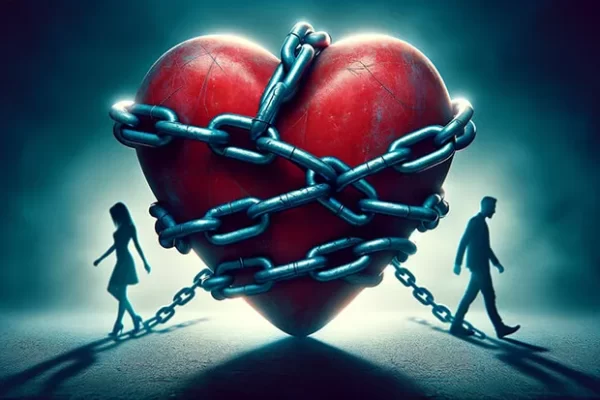Toxic relationships are a type of interpersonal relationship where unhealthy dynamics lead to emotional, psychological, and sometimes physical harm to one or both partners.
The main characteristics of toxic relationships include:
- Emotional abuse and manipulation. This may manifest in the form of humiliation, insults, ignoring the partner’s feelings, threats, and blackmail.
- Lack of respect. In toxic relationships, there is often a lack of mutual respect, which is a key component of healthy relationships. This may manifest as disrespect for boundaries, opinions, feelings, and the needs of the other person.
- Control and dependency. One partner may try to control the other by limiting their personal freedom, social contacts, financial resources, or other aspects of life. This is often accompanied by emotional or even physical dependence of the victim on the abuser.
- Constant conflicts and tension. Toxic relationships are often characterized by constant arguments, conflicts, tension, and a lack of positive communication.
- Lack of support and understanding. In healthy relationships, partners support each other, but in toxic relationships, there is often a lack of support, empathy, and understanding.
- Emotional instability. Toxic relationships can cause emotional highs and lows, guilt, anxiety, fear, shame, or inadequacy.
- Damage to self-esteem. Often in toxic relationships, one partner constantly criticizes or belittles the other, which can seriously undermine their self-respect and confidence.
- Isolation. In such relationships, one partner may try to isolate the other from friends, family, or social life, increasing their dependence and limiting social contacts.
- Inability to grow and develop. Toxic relationships hinder personal growth and development, limiting opportunities for self-expression and self-fulfillment.
Toxic relationships have serious long-term consequences for a person’s mental and physical health, including depression, anxiety, and other mental health problems. It is important to recognize the signs of toxic relationships and take steps to resolve or leave them to ensure emotional and physical well-being.
Discussing toxic relationships helps to break down social prejudices and taboos related to the issue. It helps victims feel less alone and more confident in seeking help and support.
Additionally, awareness of toxic relationships improves the general understanding of healthy and unhealthy relationship patterns. This knowledge helps people build healthier relationships in the future. By understanding the causes and mechanisms of toxic relationships, people can avoid repeating mistakes and develop healthier ways of interacting.
Discussing toxic relationships is also important for educating the youth. Providing young people with information about the signs and consequences helps them form healthy relationships from the start.
Raising awareness about toxic relationships also promotes the development and availability of resources and support, including psychological counseling, to help those in difficult situations.

Signs of Toxic Relationships
Toxic relationships can take many forms, often going unnoticed by both outsiders and the participants themselves. They often begin with lighthearted jokes, minor critical remarks, or even seeming care, but over time, these small issues escalate into serious problems that undermine emotional well-being and self-esteem. Recognizing these signs is crucial, as they are the first step toward acknowledging and addressing the issue.
The key to understanding toxic relationships lies in the details of everyday interactions. These can be repetitive behavioral patterns that evoke feelings of discomfort, humiliation, or even fear. At first glance, they may seem insignificant, but over time, they accumulate and have a detrimental effect on a person’s psychological state.
Toxic relationships often hide behind a mask of normalcy. Frequent arguments, emotional detachment, and the inability to discuss problems without conflict are just the tip of the iceberg, under which lies a deep misunderstanding and unhealthy relationship dynamics. From the outside, it may seem like just another “rough patch,” but in reality, these relationships have a long-term and destructive impact on a person’s emotional state and sense of self.
Distinguishing toxic relationships from ordinary life challenges can be difficult. They often start subtly and gradually, but over time, turn into a cycle of negative interactions that is hard to break. In such relationships, people may feel trapped, unable to see a way to improve the situation, which only worsens their suffering. This is why it is so important to recognize these signs early on to prevent further negative consequences.
Emotional and Psychological Abuse
Emotional and psychological abuse in relationships is one of the most insidious and elusive forms of abuse, as it does not leave visible marks like physical violence. It manifests through behavior that humiliates, intimidates, manipulates, or otherwise harms a person’s feelings and self-esteem.
Emotional abuse can include:
- Neglect: Ignoring the feelings, needs, and interests of a partner.
- Humiliation: Criticism, mockery, belittling dignity, often in front of others.
- Isolation: Limiting freedom and contact with friends and family.
- Manipulation: Using guilt, shame, or fear to control a partner.
- Threats and blackmail: Threats of physical violence, suicide, or other actions to keep a partner in the relationship.
- Gaslighting: Deception or lies that cause the person to doubt their memory, perception, or sanity.
- Passive-aggressive behavior: Expressing negative feelings indirectly through passive actions.
Psychological abuse also includes constant disregard for a partner’s emotional needs, creating an atmosphere of fear and insecurity, and systematically undermining self-esteem and confidence.
These forms of abuse can seriously affect the victim’s mental health, leading to depression, anxiety disorders, feelings of helplessness, and loss of self-identity. It is important to recognize and acknowledge the signs of emotional and psychological abuse to seek help in time and protect one’s mental well-being.
Lack of Mutual Respect
The lack of mutual respect is a key sign of toxic relationships. Respect is the foundation of any healthy and harmonious relationship, and its absence can lead to many problems and conflicts.
When there is no respect in a relationship, it can manifest in various ways:
- Disregard for a partner’s feelings and opinions: Ignoring or dismissing the thoughts, feelings, and opinions of the other person, failing to recognize their importance or significance.
- Criticism and belittling: Regular insults, criticism, sarcasm, or mockery aimed at undermining the partner’s self-esteem.
- Dominance and control: Attempts to control or dictate how the partner should behave, think, or feel.
- Boundary violations: Disregard for the partner’s physical, emotional, and psychological boundaries.
- Lack of support: Unwillingness to support or help the partner in difficult times, ignoring their achievements or successes.
These manifestations of disrespect often lead to emotional distancing, loss of trust, and a general deterioration in the quality of the relationship. In the absence of respect, relationships become unhealthy, resulting in emotional exhaustion for both partners. To maintain healthy and happy relationships, it is important to strive for mutual respect, understanding, and support.
Manipulation and Control
Manipulation and control in relationships are forms of emotional abuse where one partner seeks to dominate and manage the other, using various tactics to achieve their goals. These behavioral patterns can seriously affect the victim’s self-esteem and psychological well-being, creating an imbalance in the relationship.
Manipulation is often subtle and cunning, making it difficult to recognize. Some common forms of manipulation include:
- Emotional blackmail: Using guilt, fear, or obligation to influence the partner’s behavior.
- Gaslighting: Forcing the partner to doubt their memory, perception, or judgment, leading to a loss of self-confidence.
- Playing on feelings: Using knowledge of the partner’s weaknesses and fears to manipulate them.
- Threats and intimidation: Resorting to threats (physical, emotional, or financial) to control the partner.
Control in relationships can manifest as attempts to regulate various aspects of the partner’s life, including:
- Social control: Restricting the partner’s freedom to communicate with friends, family, or colleagues.
- Financial control: Managing the partner’s finances, limiting their access to funds, or making financial decisions without their consent.
- Behavior control: Establishing strict rules or expectations regarding the partner’s behavior, including their clothing, diet, or daily routine.
Manipulation and control in relationships can lead to a loss of individuality, feelings of helplessness, and emotional exhaustion. It is important to recognize these signs and take steps to protect one’s mental health.
Unequal Distribution of Responsibilities
Unequal distribution of responsibilities in relationships occurs when one partner takes on an excessive share of duties and concerns, while the other avoids participation or shifts their responsibilities onto the partner. This can relate to various aspects of shared life, from household chores to emotional support and decision-making.
In cases of unequal distribution of responsibilities, the following situations often arise:
- Household duties: One partner constantly takes care of household chores, child-rearing, and organizing family life, while the other avoids these tasks.
- Financial responsibility: One party takes on all financial burdens or manages the family budget, while the other does not participate in these processes.
- Emotional support: One partner constantly supports and cares for the feelings of the other, while their own emotional needs are ignored or undervalued.
- Decision-making: One person makes all important decisions, while the other’s opinion is often ignored or deemed unimportant.
In the long term, this dynamic can undermine mutual respect and trust in the relationship, leading to frustration and emotional distancing. For healthy and harmonious relationships, it is important to strive for fair and balanced sharing of responsibilities, where both partners share duties, support, and actively participate in each other’s lives.
Constant Tension and Anxiety
A constant feeling of tension and anxiety in a relationship is a clear sign that the dynamics between the partners are unhealthy. This state can arise when one or both partners consistently feel stressed, uncertain, or anxious because of their relationship.
The causes of these feelings may include:
- Fear of conflicts: Constant anticipation of an argument or negative interaction, leading to continuous feelings of anxiety.
- Uncertainty in the relationship: Inconsistency and unpredictability in the partner’s behavior, causing insecurity about the future of the relationship.
- Emotional tension: The constant need to be on guard or not show true feelings and emotions to avoid conflicts or misunderstandings.
- Distrust and jealousy: Regular doubts about the partner’s fidelity or fear of losing them, affecting emotional well-being and causing chronic nervous tension.
- Manipulation and control by the partner: The feeling that your actions are constantly being controlled or evaluated, creating pressure and anxiety.
- Lack of emotional support: Feeling lonely and isolated in the relationship, with no understanding or support from the partner.
- Past traumatic experiences: Previous negative experiences in relationships can also contribute to ongoing tension in current relationships.
Constant feelings of tension and anxiety can lead to emotional exhaustion, decreased self-esteem, depression, or anxiety disorders.

Consequences of Toxic Relationships
Toxic relationships leave a deep mark on people’s lives, affecting not only their present but also their future. The difficulties and problems that arise in such relationships often extend beyond the time spent with a toxic partner and can have long-term consequences. These consequences are not always obvious, but they significantly impact personal development, self-perception, and interactions with the surrounding world.
The influence of toxic relationships penetrates deeply into a person’s psychology, shaping their perception of themselves and others. From self-relationship to the ability to build healthy relationships in the future, everything is tested and changed under the influence of negative experiences. Often, such changes are subtle and ambiguous, slowly affecting various aspects of a person’s life.
Breaking off a toxic relationship, while a step towards healing, does not always immediately lead to relief or improved well-being. Echoes of the past can linger in the form of emotional scars, affecting behavior, thoughts, and feelings. Understanding how deeply these consequences can take root helps in the process of recovery and personal growth after a toxic relationship.
Emotional and Psychological Trauma
Emotional and psychological trauma is one of the most significant and profound consequences of toxic relationships, which can continue to affect a person’s life long after the relationship ends.
Emotional trauma includes deep and prolonged negative feelings, such as:
- Fear and anxiety. A constant feeling of unease and fear, even without real threat.
- Low self-esteem. A sense of inadequacy, incompetence, loss of self-confidence.
- Feelings of guilt and shame. Often, victims of toxic relationships blame themselves for what is happening, leading to deep feelings of guilt and shame.
Psychological trauma may manifest as:
- Post-Traumatic Stress Disorder (PTSD). A serious condition that can develop after experiencing severe stress, including violence or emotional trauma.
- Depression. Deep and prolonged sadness, apathy, and lack of interest in life, which may be caused by prolonged emotional pressure in toxic relationships.
- Anxiety disorders. Constant feelings of worry and anxiety, which can result from the unpredictability and tension in the relationship.
- Trust issues. Difficulties in building new relationships and trusting others after experiencing traumatic relationships.
These traumas affect many aspects of life, including the ability to build new relationships, professional activity, and overall quality of life. A person who has experienced a toxic relationship may feel helpless, isolated, and lost.
It is important to understand that recovery from emotional and psychological trauma is a process that requires time, patience, and often professional help. Support from friends, family, and specialists plays a key role in this process.
Lowered Self-Esteem and Self-Respect
Lowered self-esteem and self-respect are among the most common and serious consequences of toxic relationships. In such dynamics, manipulation, criticism, neglect, and humiliation are often present, which can deeply undermine a person’s confidence in themselves, their value, and their capabilities.
In toxic relationships, the partner often faces constant negative evaluations and criticism from the other partner, which gradually leads to a belief in their own inadequacy, unworthiness, or inability to be loved. This self-perception can infiltrate all areas of life, affecting personal, social, and professional aspects.
Lowered self-esteem and self-respect can manifest in:
- lack of confidence in one’s decisions and judgments;
- feelings of unworthiness and constant self-criticism;
- fear of expressing opinions or defending boundaries;
- increased sensitivity to criticism and negative remarks;
- tendency to take the blame for problems in the relationship;
- difficulties in setting and maintaining boundaries in other relationships;
- lack of motivation and ambition due to a belief in one’s inadequacy;
- tendency to stay in unhealthy relationships due to fear of loneliness.
Lowered self-esteem and self-respect caused by toxic relationships create a vicious cycle in which a person feels trapped in their negative thoughts about themselves, making it difficult to break free from the unhealthy situation.
This state is often accompanied by feelings of helplessness and a lack of energy to make changes in their life. People may begin to avoid social interactions, limit their professional activity, or withdraw from activities that once brought them joy. All of this intensifies feelings of isolation and loneliness.
The process of rebuilding self-esteem and self-respect after toxic relationships involves rethinking beliefs, learning self-acceptance, and developing confidence in one’s own strengths and abilities. Over time, with proper support, psychologist assistance, and self-work, it is possible to restore lost self-respect and learn to build healthy and harmonious relationships.
Problems in Social and Professional Relationships
Toxic relationships can have long-term effects not only on personal but also on social and professional aspects of a person’s life. The consequences of such relationships often extend beyond personal space, affecting interactions with friends, colleagues, and overall standing in society.
In social relationships, problems may manifest as follows:
- Isolation. Often, in toxic relationships, one partner limits the other’s social contacts, leading to a loss of close friendships and social isolation.
- Communication skills. Constant tension and stress can negatively affect communication skills, making a person less open and trusting in interactions.
- Difficulties in new relationships. Past negative experiences can cause fear and mistrust in new acquaintances, complicating the formation of new friendships and romantic relationships.
In the professional sphere, the consequences may include:
- Decreased productivity. Emotional and psychological tension can reduce concentration and effectiveness at work.
- Communication problems. Difficulties in communication and misunderstandings with colleagues and management can result from a lack of confidence and self-respect.
- Career growth. A lack of self-esteem and initiative may hinder career advancement and professional skill development.
Problems in social and professional relationships caused by toxic relationships require a conscious approach to recovery. To successfully adapt and develop in both personal and professional life, it is important to work on restoring social connections, strengthening communication skills, and boosting self-esteem.
Physical Health and Well-Being
Physical health and well-being can also suffer as a result of toxic relationships, as prolonged stress and emotional tension have a direct impact on a person’s physical state. Negative psychological experiences not only worsen the quality of life but can also lead to a range of physical problems.
Some of the physical consequences that may arise include:
- Sleep problems. Insomnia, sleep disturbances, or constant fatigue are common consequences of chronic stress and anxiety.
- Psychosomatic disorders. Stress can trigger or worsen conditions such as headaches, muscle pain, gastrointestinal issues, and other psychosomatic symptoms.
- Immune system issues. Chronic stress weakens the immune system, making the body more vulnerable to infections and illnesses.
- Cardiovascular diseases. Elevated stress levels can contribute to the development of hypertension, heart disease, and increase the risk of heart attacks.
- Changes in appetite and weight. Stress may lead to changes in eating behaviors, including overeating or loss of appetite, which affects weight and overall health.
- Emotional exhaustion. Prolonged emotional tension can lead to physical exhaustion, reduced energy, and overall worsening of well-being.
These physical symptoms are important signals that toxic relationships are having a serious impact not only on mental but also on physical health. It is essential to pay attention to these signals and take steps to improve physical health, including seeking medical help if necessary, taking care of oneself through proper nutrition, exercise, and sufficient rest.
Recovery from toxic relationships is a complex process that involves caring for both mental and physical health. A balanced approach, including psychological support and self-care, will contribute to healing and restoring quality of life.
Long-Term Mental Health Consequences
The long-term mental health consequences of toxic relationships can be deep and diverse, as such relationships affect the most fundamental aspects of a person’s personality and emotional well-being. Prolonged exposure to a toxic environment can leave emotional scars that will require significant effort and time to heal.
Among the long-term mental health consequences, the following can be highlighted:
- Post-Traumatic Stress Disorder (PTSD). Experiencing severe emotional trauma in toxic relationships can lead to the development of PTSD, characterized by flashbacks, nightmares, constant anxiety, and avoidance of situations reminiscent of the trauma.
- Depressive disorders. Long-term exposure to negative emotions and stress can trigger the development of clinical depression, accompanied by deep sadness, apathy, loss of interest in life, and loss of motivation.
- Anxiety disorders. The constant sense of uncertainty and fear in toxic relationships can lead to chronic anxiety, phobias, and panic attacks.
- Distorted self-esteem and self-respect. Prolonged exposure to a toxic environment can lead to a deep decline in self-esteem and self-respect, affecting the overall perception of oneself and one’s place in the world.
- Trust issues and difficulty forming relationships. Toxic relationships can leave a person with a deep sense of mistrust in others, making it difficult to build new healthy relationships.
- Avoidant or dependent behavior. A person may develop avoidance strategies to avoid encountering similar situations in the future, or conversely, become dependent on toxic relationships as a familiar environment.
- Somatization. Emotional distress and stress may manifest as physical symptoms such as chronic pain, gastrointestinal issues, and other psychosomatic disorders.
It is important to note that recovery after toxic relationships is possible, but it takes time and often requires professional help. This may include psychotherapy, treatment for specific disorders if present, support from loved ones, and self-care for emotional and physical health. The healing process may be challenging and long, but it opens the path to a healthier and happier life.

Toxic Relationships: Causes
In a world where every relationship is unique with its ups and downs, understanding why some of them turn toxic becomes key to preventing and resolving such situations. Toxic relationships do not appear out of nowhere; they result from a complex interplay of personal traits, past experiences, social influences, and many other factors that can be both obvious and hidden, sometimes remaining unnoticed until their consequences become too clear.
Understanding the causes of toxic relationships helps not only in resolving them but also in preventing similar scenarios from repeating in the future. The interaction between personal beliefs, emotional wounds, and behavioral patterns plays a significant role in forming the dynamics of relationships. Often, the causes are rooted in deep layers of psychology and a person’s life experiences.
Exploring these causes requires deep self-reflection and, at times, professional help. This allows not only the identification of hidden motives and unhealthy behavioral models but also provides an opportunity to develop healthier strategies for interaction in relationships. Realizing how various factors contribute to the formation of toxic relationships is the first step towards overcoming them and building a happier and more harmonious personal life.
Psychological Aspects of Abuser Behavior
The psychological aspects of abusers’ behavior (those who engage in abuse or violence in relationships) play a crucial role in the emergence of toxic relationships. These aspects can be complex and multifaceted, driven by various factors, including past life experiences, psychological traumas, personal characteristics, and sociocultural influences. Understanding these aspects can help in identifying and preventing toxic relationships.
- Past traumas and life experiences. Many abusers have themselves been victims of violence or abuse in the past. This may include childhood traumas, abuse within the family, or previous relationships. Unresolved psychological traumas can lead a person to repeat learned behaviors in their own relationships.
- Desire for control. A central aspect of many abusers’ behavior is the desire to control their partner. This may be linked to inner insecurity and the fear of losing control, which is compensated by dominating the partner.
- Low self-esteem. Ironically, behind the aggressive and controlling behavior of the abuser often lies low self-esteem and a sense of inadequacy.
- Sociopathic and narcissistic traits. Some abusers possess narcissistic or sociopathic personality traits, which include a lack of empathy, egocentrism, manipulativeness, and an inability to admit their mistakes.
- Cultural and social factors. In some cases, norms and beliefs inherent in culture or social groups may contribute to abusive behavior, particularly ideas about gender roles, power, and control.
- Problems with emotional regulation. Abusers often have difficulty managing their emotions, which may manifest in outbursts of anger, aggression, jealousy, and an inability to respond appropriately to stressful situations.
Understanding the psychological aspects of abusers’ behavior is important for both victims of toxic relationships and professionals working in the field of mental health and social support. This knowledge helps in identifying warning signs and developing protective and intervention strategies aimed at preventing and overcoming toxic relationships. However, it is important to remember that responsibility for abusive behavior always lies with the abuser, and the victim should not blame themselves for what is happening.
The Impact of Past Relationships and Family Upbringing
Past relationships and family upbringing play a significant role in shaping behavioral patterns that can lead to the emergence of toxic relationships. Experiences gained in early childhood and previous relationships often unconsciously influence how a person perceives themselves and others in the context of close relationships.
- Modeling family relationships. People often adopt behavior patterns observed in their family. If control, manipulation, emotional or physical abuse were present, a child might grow up with a distorted understanding of what healthy relationships are. These models may become the “norm” that the individual will strive for or replicate in their own relationships.
- Relationships with parents. The attachment style developed in childhood with parents influences future romantic relationships. For example, an overly strong attachment may lead to excessive control or, conversely, avoidant behavior in adult relationships. These patterns can create fertile ground for toxic interactions if not recognized and addressed.
- The influence of previous relationships. Past romantic relationships also leave a mark on a person’s emotional memory. For example, if they experienced abuse or betrayal in previous relationships, it may lead to building defense mechanisms such as distrust, fear of intimacy, or repeating toxic behavior patterns.
- Lack of healthy relationship examples. If there were no examples of healthy emotional communication, respect, and support in the family or past relationships, the individual may lack the necessary skills to build harmonious relationships. This includes conflict resolution skills, expressing feelings and needs, setting boundaries, and mutual respect.
- Repetition of familiar scenarios. Often, people unconsciously seek partners with traits familiar to them from past relationships or family experiences, even if those traits are negative. This is linked to the psychological tendency to repeat familiar scenarios and attempt to “fix” past relationships through new ones.
Addressing these complex factors requires deep self-awareness and, in some cases, professional help. Understanding the influence of past relationships and family upbringing aids in identifying and changing ineffective or harmful behaviors, which can be used to build healthier and more balanced relationships in the future. Working on oneself, recognizing emotional needs, and setting healthy boundaries are key elements to overcoming the negative impact of the past and preventing the formation of toxic relationships.
Social and Cultural Factors
Social and cultural factors play a significant role in shaping toxic relationships, influencing how people perceive what is considered acceptable and normal in relationships. These factors develop throughout a person’s life through interactions with family, society, and culture as a whole, and can unconsciously affect partner choices and behavior patterns in relationships.
- Gender roles and stereotypes. Traditional ideas about male and female roles in society can contribute to inequality and power imbalances in relationships. For example, the notion of men as dominant and controlling partners and women as submissive and caregiving often creates conditions for emotional and physical abuse.
- Cultural beliefs and norms. In some cultures, beliefs and social norms that may support toxic relationships exist, such as the stigma of divorce, the inadmissibility of discussing personal relationships outside the family, or the disapproval of being single.
- Social pressure and expectations. Pressure to conform to certain societal expectations, such as the need to be in a relationship, marriage by a certain age, or having children, can push people to stay in unhealthy relationships or enter them for the wrong reasons.
- Media and pop culture. The portrayal of relationships in movies, TV shows, and literature often romanticizes toxic behavior, presenting it as acceptable or even desirable. This distorts the perception of what is healthy and normal in relationships.
- Economic and social conditions. Factors such as financial dependence, low levels of education, or limited opportunities for social mobility can make people feel stuck in toxic relationships.
- Religious and spiritual beliefs. In some cases, religious or spiritual beliefs can support or justify toxic behavior, for example, through ideas of submission or suffering as a virtue.
Insecurity and Emotional Dependence
Personal insecurity and emotional dependence play a significant role in the formation and maintenance of toxic relationships. These internal factors can contribute to the development of unhealthy interactions, as they affect a person’s ability to set boundaries, express needs, and make choices that favor healthy relationships.
- Personal insecurity. People with low self-esteem and insecurity often feel unworthy of love and respect. This may lead them to tolerate negative or exploitative behavior because they believe they don’t deserve better. Insecurity can also lead to an excessive need for approval and attention from the partner, creating fertile ground for manipulative and controlling relationships.
- Emotional dependence. Emotionally dependent people may overly rely on their partner for support, comfort, and validation of their self-worth. Such dependence makes them fear breaking up, even if the relationship is harmful or painful. Emotionally dependent individuals may also suffer from fear of loneliness or feelings of inadequacy without a partner, making them vulnerable to toxic relationships.
- Lack of boundary-setting skills. Insecurity and dependence often lead to difficulties in setting healthy boundaries in relationships. This may manifest as an inability to say “no,” fear of expressing one’s feelings and needs, or ignoring personal comfort and well-being to please the partner.
- Fear of decision-making. Insecure individuals may avoid making important decisions in relationships, relying on their partner to determine the course of their joint life. This often leads to an imbalance of power in the relationship and worsens the toxic dynamic.
- Distorted perception of love and relationships. Sometimes insecure and dependent people start to perceive toxic behavior as a manifestation of love or care, further reinforcing unhealthy relationship patterns.
Working on self-esteem, developing boundary-setting skills, and reducing emotional dependence is key to preventing and overcoming toxic relationships. Self-awareness, self-development, and, when necessary, professional psychological help allow one to overcome these internal issues and build healthy, balanced relationships.
It is important to remember that every person deserves respect, care, and support in relationships, and no personal insecurity or dependence should serve as a justification for toxic behavior from a partner.

How to Break Free from Toxic Relationships
Breaking free from toxic relationships requires strength, courage, and determination. This process is often challenging and emotionally intense, but it is an essential step toward personal well-being and mental health. Deciding to leave toxic relationships behind is the beginning of a journey toward self-liberation and regaining control over your life.
The first step on this path is realizing that the relationship is indeed toxic and that it brings more harm than good. This may require deep self-reflection and possibly professional help from psychologists or therapists. Understanding that healthy relationships should be based on mutual respect, support, and care helps to draw a clear line between normal and destructive behavior.
The process of leaving toxic relationships requires not only emotional strength but also practical planning. It may include developing a safety strategy, especially in cases where there is a threat of physical violence, and seeking support from friends, family, or professionals. It’s important to understand that each step toward freedom and independence brings you closer to a life free from toxic influence and full of self-respect.
Professional Psychological Help
Seeking professional psychological help is a vital step in breaking free from toxic relationships. A specialist can provide the necessary support, tools, and strategies for effectively addressing complex emotional issues. Psychotherapy helps to understand the deep-rooted reasons why a person ended up in toxic relationships and to develop ways to overcome them.
A qualified psychologist offers a safe space to discuss experiences, fears, and anxieties related to toxic relationships. Through the psychotherapeutic process, individuals can gain insight into their emotional needs, learn to set healthy boundaries, and develop strategies to boost self-esteem and self-respect. Additionally, the psychologist may offer specific methods and techniques to deal with stress, anxiety, and other consequences of toxic relationships.
Professional psychological help is also crucial in situations where a safe exit plan from the relationship is required, especially if there is a threat of physical violence. A therapist can help identify resources and support available to ensure safety and well-being on the path to recovery and independence.
Setting Boundaries and Strengthening Self-Esteem
Setting boundaries and strengthening self-esteem are key components in the process of breaking free from and recovering after toxic relationships. These aspects help build healthy relationships and maintain emotional well-being.
Setting boundaries involves defining what is acceptable and what is not in relationships and interactions with others. This may include personal space, emotional needs, communication preferences, and behavioral standards. Boundaries are essential for protecting your emotional well-being and ensuring mutual respect in relationships.
Strengthening self-esteem begins with inner dialogue and self-perception. This is a process in which you learn to value yourself, recognize your strengths and achievements, and treat yourself with kindness and compassion. Strengthening self-esteem helps to withstand external negative influences and reduces the likelihood of falling into toxic relationships again.
Working on setting boundaries and strengthening self-esteem may include self-reflection, reading educational literature, participating in support groups, or working with a psychologist. These steps help to develop confidence and the ability to effectively protect your interests and emotional well-being.
How to Safely Exit Toxic Relationships?
Strategies for safely exiting toxic relationships require careful planning and a thoughtful approach, especially in situations where there is a threat of physical violence or severe emotional harm. Here are some tips to help in this process:
- Develop a safety plan. Prepare a course of action in case of an escalation of violence or a threat to your safety. This may include planning a safe place to go and rehearsing ways to quickly leave a dangerous situation.
- Seek support. Turn to friends, family, colleagues, a psychologist, a lawyer, or social workers for help. Having a support network can provide emotional and practical assistance.
- Financial planning. If possible, take care of financial independence. This may include saving money, opening a separate bank account, or looking for a job.
- Prepare documents. Gather all important documents, such as your passport, driver’s license, medical records, and financial papers, which may be needed for relocation or legal actions.
- Determine a place of residence. Identify where you can move to, whether it’s a friend’s home, a relative’s, or a specialized shelter for domestic violence victims.
- Develop a communication strategy. Consider how and when you will inform your partner about your decision to leave if you believe it’s necessary and safe. In some cases, it is better to avoid direct communication and leave without warning.
- Call a hotline. Many cities have hotlines, support centers, and other resources for people who want to break free from toxic relationships. They can offer consultations, legal help, temporary shelter, and other forms of support. In Ukraine, the hotline for combating human trafficking, domestic violence, gender-based violence, and violence against children operates 24/7 and is free at 1547.
- Plan for long-term recovery. Think about a long-term recovery plan after leaving the relationship, which may include psychotherapy, personal development, and strategies to strengthen emotional well-being.
It is important to remember that your safety is the priority when exiting toxic relationships. Each step should be carefully planned.
The Importance of Support from Friends and Family
The importance of support from friends and family during the process of breaking free from toxic relationships and the subsequent recovery cannot be overstated. The emotional support, understanding, and comfort that loved ones provide play a crucial role in boosting self-confidence and healing after traumatic experiences. Friends and family can offer a reliable foundation, practical help, such as temporary housing or financial support, and a sense of safety and belonging.
The presence of trusted and caring individuals helps to cope with the loneliness and isolation that often accompany toxic relationships. Loved ones can help you see the situation from a different perspective, offer an objective view, and recognize harmful behavior patterns. They can also be a vital source of feedback and a reminder of your value and strength.
Loved ones can also provide emotional support during the search for professional help, such as consultations with a psychologist or lawyer. Their presence during consultations or meetings can offer additional confidence and support.
However, it’s important to remember that boundaries and respect for personal space are essential, even in relationships with close ones. Support should be healthy and contribute to independence, not fuel dependency or unhealthy attachment.

How to Recover from Toxic Relationships
Recovering from toxic relationships is a journey that requires time, patience, and self-awareness. This process often involves reevaluating personal values, reassessing past relationships, and regaining lost self-esteem. Each step in this direction is a step towards a better version of yourself, towards a life where respect, love, and care are the foundation of relationships.
The process of recovery from toxic relationships can be challenging and emotionally intense. It is a journey toward self-acceptance and self-love, starting with an internal acknowledgment and recognition of the experienced trauma. It’s important to understand that everyone experiences this process differently, and there is no single script or timeframe for recovery.
The path to recovery may include several stages, starting from recognizing the harm caused by toxic relationships to building new, healthy habits in interacting with others. This process may require learning new ways of self-expression and self-care, reevaluating personal boundaries, and striving for emotional balance.
Recovering from toxic relationships is not only about ending something harmful, but also about growth, self-development, and opening new horizons in personal life.
Working on Restoring Self-Esteem and Self-Respect
Working on restoring self-esteem and self-respect after toxic relationships is a crucial part of the healing and personal growth process. It takes time and effort, but the results can radically change the quality of your life.
- Acknowledging your own worth. Start by reevaluating your qualities and achievements. Make a list of your strengths, talents, successes, and positive traits. Remember, your worth does not depend on others’ opinions.
- Practicing positive self-perception. Work on changing your inner dialogue. Replace self-criticism and negative thoughts with positive affirmations and reminders of your uniqueness and value.
- Setting boundaries. Learn to say “no” and protect your interests. Setting clear boundaries strengthens self-respect and shows that you value and respect yourself.
- Self-care. Dedicate time to taking care of yourself – physically and emotionally. This may include exercising, healthy eating, hobbies, relaxation, and meditation before sleep.
- Learning and development. Keep learning and growing. Reading books, attending courses, and seminars on personal growth can help expand your horizons and boost self-esteem.
- Relationships and communication. Strive to build healthy relationships, surround yourself with supportive people who respect and value you. Avoid toxic individuals who undermine your self-esteem.
- Psychological help. Don’t hesitate to seek professional help. Working with a psychologist can help you understand complex feelings, manage negative thoughts and emotions.
Remember, by restoring your self-esteem and self-respect, you’ll feel more confident in your decisions and actions, and you’ll learn to value and respect yourself, regardless of external circumstances or others’ opinions.
Psychotherapeutic Methods and Self-Help
Psychotherapeutic methods and self-help play an important role in the recovery process after toxic relationships. They help people process past trauma, develop new coping mechanisms for stress, and build healthy relationships.
Psychotherapeutic Methods:
- Cognitive Behavioral Therapy (CBT) helps identify and change negative thought patterns and behaviors that may maintain toxic relationships and low self-esteem.
- Psychoanalysis and psychodynamic therapy work with deep, often unconscious emotional conflicts and experiences that may affect current relationships and behavior.
- Gestalt therapy focuses on the present moment, helping to become aware of and accept feelings and behaviors, as well as resolve unresolved emotional conflicts.
- Systemic family therapy explores family structures and dynamics that may influence individual behavior and relationships, helping develop healthier ways of interacting within the family.
- Group therapy provides an opportunity to share experiences and receive support from others facing similar issues, fostering a sense of solidarity and understanding.
Self-Help Methods:
- Self-reflection and journaling, where you express your feelings and thoughts, can help process experiences and facilitate self-awareness.
- Meditation and mindfulness aimed at developing awareness and presence in the moment help reduce stress and improve emotional well-being.
- Physical activity, such as regular exercise, yoga, or sports, helps reduce tension and boost mood.
- Hobbies and creative activities that bring joy and allow self-expression, such as drawing, singing, dancing, or writing, can be a great way to relax and express yourself.
- Social contacts and communication with friends plus participation in social life help strengthen the sense of belonging and support.
- Relaxation techniques, such as deep breathing, progressive muscle relaxation, or aromatherapy, help relieve tension and improve well-being.
It’s important to remember that the recovery process is individual, and what works for one person may not work for another. Experimenting with different self-help and psychotherapy methods can help find the most effective ways for personal healing and growth. Openness to change, patience, and consistency in applying these methods will contribute to recovery and the strengthening of mental health after toxic relationships.
Building Healthy Relationships in the Future
Here are several tips that can help you avoid repeating past mistakes and create a foundation for respectful and supportive relationships in the future.
- Self-awareness. Understanding your own values, desires, and boundaries is key to building healthy relationships. Knowing what is important to you and what you expect from a relationship helps in choosing the right partner and forming relationships based on mutual respect and understanding.
- Setting boundaries. Clear personal boundaries are essential for healthy relationships. This includes the ability to say “no,” express your needs and expectations, and respect your partner’s boundaries.
- Communication. Open and honest communication is the foundation of any healthy relationship. It is important to be able to discuss problems, express feelings, and listen to your partner without judgment or accusations.
- Mutual respect. Respecting your partner’s personality, choices, and feelings is fundamental to healthy relationships. It also means respecting yourself and your feelings.
- Independence. In healthy relationships, both partners maintain their individuality and independence. This includes personal interests, friends, and time for oneself.
- Trust. Building mutual trust takes time and effort, but it is a crucial component of healthy relationships. This includes honesty, reliability, keeping promises, and being open with your partner.
- Conflict resolution. Disagreements are inevitable in any relationship, but it’s important to learn how to resolve them in a healthy way. This involves expressing your feelings and concerns without aggression or accusations, active listening, and trying to find a compromise or solution that satisfies both parties.
- Self-development not only enhances personal life but also contributes to healthy relationships. By growing as a person, you bring more to the relationship and can better understand and support your partner.
- Mutual support. In healthy relationships, partners support each other in difficulties, celebrate successes, and help each other in personal and professional development. Mutual support strengthens the bond and allows partners to rely on each other in any circumstances.
- Flexibility and acceptance. Being flexible in relationships and accepting your partner as they are, without trying to change them, is an important aspect of healthy relationships. Accepting differences, being tolerant of each other’s traits, and being willing to adapt help create harmonious relationships.
- Positive perception. Focusing on the positive aspects of the relationship and your partner, rather than on flaws, contributes to strengthening the bond and happiness.
- Professional help. If necessary, do not hesitate to seek help from specialists, especially if you are facing difficulties in building or maintaining healthy relationships. Consulting a psychologist can provide additional tools and strategies for resolving issues and improving interaction with your partner.
- Self-acceptance and forgiveness. Working on self-acceptance and the ability to forgive yourself and others for mistakes and shortcomings contributes to creating healthier and more harmonious relationships. Understanding that no one is perfect and that everyone has weaknesses helps develop a more tolerant and understanding attitude towards your partner.
- Maintaining balance. Learn to maintain a balance between personal space and time spent with your partner. Respecting personal space helps avoid excessive dependence and creates a foundation for a strong union.
Building healthy relationships is a process that requires conscious participation and mutual effort from both partners. It involves not only caring for and supporting each other but also continuous work on yourself, your emotions, and behavior. Healthy relationships are built on mutual respect, trust, and a sincere desire to see each other happy.

Prevention of Toxic Relationships
Prevention of toxic relationships starts with a deep understanding of what makes relationships healthy and an awareness of signs that might indicate potential problems. It’s important to know the factors that contribute to developing healthy relationships and the behavioral patterns and communication strategies that can protect from falling into the trap of toxicity. Understanding one’s own value, setting clear boundaries, and the ability to communicate effectively are key components in preventing unhealthy relationships.
Awareness and self-knowledge play a crucial role in this process. Understanding one’s own needs, desires, and boundaries helps to clearly define what is acceptable in relationships and what is not. This awareness empowers individuals to stand up for their rights and avoid interactions that could be harmful or destructive.
Additionally, it’s important to develop skills in healthy communication and conflict resolution, which allow for expressing feelings and opinions without creating tension or misunderstandings. This helps to prevent the accumulation of grievances that can lead to toxic interactions.
Education and awareness of the signs of toxic relationships are also major factors in prevention. Knowing what emotional abuse, manipulation, control, and other unhealthy aspects of relationships are enables individuals to recognize potentially dangerous situations more quickly. Discussing these topics in educational programs, seminars, or through media contributes to increasing public awareness and strengthening healthy relationships in society.
Overall, the prevention of toxic relationships is a combination of personal awareness, education, and skill development that together help to build strong and healthy relationships.
Education and Awareness of Healthy Relationships
Education and awareness of healthy relationships are key factors in forming stable and mutually respectful interactions between people. Understanding what makes relationships healthy helps individuals recognize and avoid unhealthy behavioral patterns, building relationships based on respect, trust, and mutual support.
- Key components of healthy relationships. Education in this area includes understanding key elements such as open communication, honesty, trust, respect, equality, and mutual support. It’s important to realize that healthy relationships require work and mutual effort from both partners.
- Development of communication skills. The ability to communicate effectively is one of the key aspects of healthy relationships. This includes the ability to express feelings and needs without fear or aggression, as well as the ability to actively listen and understand the partner.
- Setting and respecting boundaries. Education helps people understand the importance of setting personal boundaries and respecting the boundaries of others. This is a key element in maintaining healthy relationships, preventing pressure and control from the partner.
- Identifying and preventing toxic behavior. Education in the area of healthy relationships includes awareness of the signs of toxic relationships, such as manipulation, emotional abuse, excessive jealousy, and control. Understanding these signs helps avoid unhealthy relationships or leave them when they already exist.
- Development of self-awareness and self-respect. A sense of completeness and understanding of personal needs and desires helps build healthy relationships. Education in this area focuses on strengthening self-esteem and self-respect, which is the foundation for avoiding dependent and toxic relationships.
- Continuous learning and development. Healthy relationships require continuous learning and adaptation. Educational programs and self-development provide useful tools and knowledge to support healthy and happy relationships throughout life.
Thus, education and awareness help people build relationships on a solid foundation of mutual understanding and respect, ensuring a healthy emotional environment for both individual growth and relationship development.
Early Signs of Toxic Relationships
The ability to recognize early warning signs of toxic relationships is an important skill that helps prevent emotional and psychological harm from unhealthy interactions. Here are some of these signs:
- Ignoring or disrespecting boundaries. If a partner constantly ignores your personal boundaries, makes decisions for you, or doesn’t respect your right to personal space, this may be an early sign of toxicity.
- Emotional pressure. Early signs may include excessive demands on your time and attention, frequent outbursts of jealousy, or unreasonable expectations for you to constantly prove your love or commitment.
- Excessive criticism. Regular criticism of you, your interests, appearance, or opinions, especially when done in a demeaning way, may indicate toxicity in the relationship.
- Lack of support. The absence of emotional support, indifference to your feelings and needs, and refusal to acknowledge your achievements and successes may be early signs of toxicity. Healthy relationships are characterized by mutual support and positive attention to each other’s successes and concerns.
- Control and manipulation. Attempts to control your behavior, finances, social contacts, or decisions can be early warning signs. Manipulative behavior aimed at making you feel guilty or obligated is also a red flag.
- Instability and unpredictability. If your partner’s behavior is inconsistent, and you always feel on edge due to their unpredictable reactions or mood swings, this may indicate instability in the relationship.
- Isolation. Attempts to limit your contact with friends, family, or participation in social events are a serious warning sign of potential control and isolation in the relationship. Isolation from your social circle increases dependence on the partner and limits your access to support and an objective perspective on the relationship.
- Rapid changes in the relationship. If the relationship develops too quickly, and your partner pressures you into making serious commitments or changes in your life right away, this may be a sign of an attempt to control and possess.
- Lack of trust. If your partner constantly doubts your actions, checks up on you, or demands constant confirmation of your whereabouts or actions, this may indicate issues with trust and controlling behavior.
- Emotional detachment. Unwillingness to share feelings, thoughts, or plans for the future can be a sign of emotional closeness and a lack of desire to build a close relationship. A lack of emotional connection and openness can create distance and alienation in the relationship.
- Negative impact on self-esteem. If the relationship is leading to a decline in your self-esteem, making you feel inadequate or helpless, this is a serious warning signal. Healthy relationships should support your self-respect and contribute to personal growth, not undermine your confidence.
- Physical or emotional abuse. Any signs of physical violence or emotional abuse, including threats, intimidation, humiliation, and ridicule, are unacceptable and clear signs of a toxic relationship. Emotional abuse can be less visible but also has a deeply negative impact on mental health.
Recognizing these early warning signs helps prevent the development of toxic relationships or exit them in time, preserving your emotional well-being and physical safety. It’s important to trust your feelings and intuition; if something feels wrong, it is a signal for reflection and possibly action. It’s always useful to discuss your concerns with a trusted person or a psychologist to gain an objective perspective on the situation and determine the best course of action for yourself.
Importance of Self-Awareness and Emotional Intelligence
Self-awareness and emotional intelligence play key roles in forming healthy relationships and personal growth. These qualities help to better understand one’s emotions, motives, and behavior, as well as foster deeper understanding and empathy for others.
- Self-awareness is the ability to recognize one’s own feelings, thoughts, and behavior in real time. Self-awareness allows a person to understand how their inner world affects interactions with others and how their actions are perceived by others. It also includes awareness of personal strengths and weaknesses, values, and beliefs.
- Emotional intelligence is the ability to recognize, understand, and manage one’s own emotions, as well as recognize and respond to the emotions of others. High emotional intelligence helps build strong, healthy relationships, as it promotes effective communication, empathy, and mutual understanding.
- Reflection and self-analysis. Regular self-observation and reflection on one’s feelings and actions help improve self-awareness. This includes evaluating one’s behavior in various situations and understanding what factors influence your emotional state.
- Emotion management. A key component of emotional intelligence is the ability to manage your own emotions, especially in difficult or stressful situations. This includes skills in adjusting reactions to be appropriate to the circumstances and the ability to calm oneself in moments of strong emotional tension.
- Empathy. The ability to understand the feelings of another person is an important part of emotional intelligence. Empathy helps to build deep and meaningful relationships, as it fosters an atmosphere of trust and mutual understanding.
- Constructive communication. Understanding your own emotions and the emotions of others improves communication skills, allowing you to express thoughts and feelings openly and honestly, while respecting the feelings of the interlocutor.
- Learning and self-development. Developing emotional intelligence and self-awareness often requires continuous learning and self-development, including reading literature, participating in training and seminars, and working with a psychotherapist or coach. This helps not only in personal relationships but also in professional settings, improving leadership qualities and the ability to work in a team.
- Self-respect and self-acceptance. Developing a healthy relationship with oneself, respecting one’s own feelings and needs, as well as accepting oneself with all strengths and weaknesses, improves the quality of personal relationships.
By developing self-awareness and emotional intelligence, a person not only enhances their interpersonal relationships but also contributes to their own psychological well-being and personal growth. These qualities help better understand and accept oneself and others, facilitating the building of harmonious relationships.

Conclusion
In conclusion, I would like to highlight key points for understanding and overcoming toxic relationships. Recognizing that toxic relationships harm emotional and sometimes physical well-being is the first step toward overcoming them. It is important to recognize early warning signs and not ignore your intuition.
Setting boundaries, developing self-respect, and practicing self-care are essential aspects of the recovery process. Support from friends, family, and professionals can be invaluable. It is crucial to remember that leaving a toxic relationship and recovering from it is a process that requires time, patience, and personal effort. It involves not only eliminating the negative effects of toxic relationships but also building a new foundation for future healthy relationships.
Furthermore, preventing toxic relationships through education and awareness of healthy relationships is key to avoiding similar situations in the future. Developing healthy relationships is based on mutual respect, trust, and support, as well as each partner’s ability to maintain their individuality and independence.
Ultimately, it is important to understand that everyone deserves to be in relationships where they feel valued, respected, and loved. Leaving a toxic relationship opens the door to a happier and healthier life. This path may not be easy, but it is worth the effort because it leads to meaningful harmony. Remember, support and help are always available, and it is never too late to start building a better future.

Recommended Reading
Here is a list of books that may be helpful in understanding toxic relationships:
- “Love’s Executioner” – by Irvin Yalom. The book by the renowned psychotherapist contains stories of therapeutic encounters, including cases related to toxic relationships.
- “Women Who Love Too Much” – by Robin Norwood. This book focuses on women who find themselves in toxic relationships.
- “Games People Play” – by Eric Berne. This book examines various types of psychological games in interpersonal relationships, including toxic ones.
- “Toxic People” – by Lillian Glass. This book helps identify toxic people and offers strategies for effective communication with them or completely removing them from your life.
- “Boundaries: When to Say Yes, How to Say No” – by Henry Cloud and John Townsend. This book explains how to establish and maintain healthy boundaries in various types of relationships, which is a key aspect of avoiding toxic interactions.
Each of these books provides a unique perspective and useful tools for understanding, overcoming, and recovering from toxic relationships. They can be helpful not only for those who are directly dealing with toxic relationships but also for professionals working in the field of psychology and interpersonal relationships.




